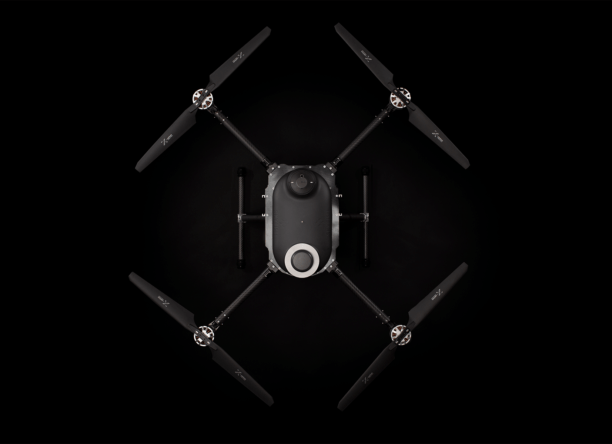
by DRONELIFE Staff Writer Ian M. Crosby
U.S. Sens. Mark R. Warner (D-VA) and John Thune (R-SD) introduced today the Increasing Competitiveness for American Drones Act of 2023, legislation that will simplify the approvals process for beyond visual line of sight (BVLOS) drone flights and enable the use of drones for commercial transport of goods across the country.
Continue reading below, or listen:
At present, each aircraft and BVLOS operation requires a waiver from the Federal Aviation Administration (FAA), yet the FAA lacks a consistent set of criteria for the granting of waivers. The bipartisan Increasing Competitiveness for American Drones Act will require the FAA to set forth a rule authorizing BVLOS operations under certain circumstances.
“Drones have the ability to transform so much of the way we do business. Beyond package delivery, drones can change the way we grow crops, manage disasters, maintain our infrastructure, and administer medicine,” said Sen. Warner. “If we want the drones of tomorrow to be manufactured in the U.S. and not in China, we have to start working today to integrate them into our airspace. Revamping the process for approving commercial drone flight will catapult the United States into the 21st century, allowing us to finally start competing at the global level as technological advancements make drone usage ever more common.”
“Drones have the potential to transform the economy, with innovative opportunities for transportation and agriculture that would benefit rural states like South Dakota,” said Sen. Thune. “I’m proud to support this legislation that provides a clear framework for the approval of complex drone operations, furthering the integration of these aircraft into the National Airspace System.”
The new bill requires the FAA to establish a “risk methodology” for determining the necessary level of regulatory scrutiny. Operators of small UAS under 55lbs will need to declare that they conducted a risk assessment and meet the standard, while operators of UAS between 55lbs and 1320lbs must submit materials based on the risk assessment to the FAA to seek a “Special Airworthiness Certificate.” UAS in this latter category may be limited to operating at a maximum of 400 feet above ground level. Operators of UAS over 1320lbs will still be required to undergo the complete type certification process.
The Increasing Competitiveness for American Drones Act would also establish the position of “Associate Administrator of UAS Integration” and a UAS Certification Unit with the sole authority to issue all rulemakings, certifications, and waivers. This new central rulemaking body for UAS would result in a more uniform process.
“Commercial drone operations provide valuable services to the American public and workforce – but significant regulatory hurdles are hampering these benefits from reaching their fullest potential and jeopardize U.S. global leadership in aviation,” said Michael Robbins, Chief Advocacy Officer of the Association for Uncrewed Vehicle Systems International (AUVSI). “The regulatory challenges are not driven by safety, they are hampered by bureaucracy. We accordingly have urged Congress to prioritize drone integration, and we are grateful for the support of Senators Warner and Thune in this cause. AUVSI is proud to endorse this legislation, and we urge Congress to include it as part of their critical work this year to pass a multi-year FAA Reauthorization.”
“The Coalition is grateful for the leadership of Senators Thune and Warner, and this bill comes at a pivotal time for the drone industry. Since 2012, Congress has worked to progress the law and regulation around commercial drone use, but now, in 2023, this progress has slowed as regulations and approvals continue to be delayed,” said The Small UAV Coalition. “With reauthorization of Federal Aviation Administration (FAA) programs required by September 30, this year is a critical time for the drone industry.”
“The Commercial Drone Alliance applauds the introduction of the Increasing Competitiveness for American Drones Act of 2023, and we commend and thank Senator Warner and Senator Thune for their leadership on these important issues,” said The Commercial Drone Alliance. “While the U.S. has lagged behind other countries in developing and deploying uncrewed aircraft systems (UAS), this legislation provides the U.S. with the opportunity to reestablish its prominence as a global leader in advanced aviation and compete more effectively in the global economy.”
A staunch supporter of research and investment in unmanned systems, Sen. Warner has previously put forth legislation intended to propel UAS development and assist with their safe integration into the National Airspace System. Virginia houses one of seven FAA-approved sites in the country where researchers are exploring the optimal ways to introduce UAS into the existing airspace – including the first-ever package delivery by drone to take place in the United States. The senator visited the headquarters of Virginia-based drone delivery leader DroneUp this past October.
“Commercial drone operations provide valuable services to the American public and workforce – but significant regulatory hurdles are hampering these benefits from reaching their fullest potential and jeopardize U.S. global leadership in aviation. The regulatory challenges are not driven by safety, they are hampered by bureaucracy. We accordingly have urged Congress to prioritize drone integration, and we are grateful for the support of Senators Warner and Thune in this cause,” Michael Robbins added. “AUVSI is proud to endorse this legislation, and we urge Congress to include it as part of their critical work this year to pass a multi-year FAA Reauthorization.”
The new legislation can be viewed in full here.
Read more:
- U.S. Senators Take Another Shot at DJI: the Countering CCP Drones Act
- Senator Lee Introduces Drone Integration and Zoning Act
- Drones in Education: AMA Thanks Senators for Supporting Educational Programs
- U.S. Lawmakers Express Frustration With Drone Remote ID Delay, This Summer Says Standards Committee Chair
- Drone Legislation: Former Congressmen Urge Lawmakers to Avoid Sweeping and Ineffectual Bans
Ian attended Dominican University of California, where he received a BA in English in 2019. With a lifelong passion for writing and storytelling and a keen interest in technology, he is now contributing to DroneLife as a staff writer.
Miriam McNabb is the Editor-in-Chief of DRONELIFE and CEO of JobForDrones, a professional drone services marketplace, and a fascinated observer of the emerging drone industry and the regulatory environment for drones. Miriam has penned over 3,000 articles focused on the commercial drone space and is an international speaker and recognized figure in the industry. Miriam has a degree from the University of Chicago and over 20 years of experience in high tech sales and marketing for new technologies.
For drone industry consulting or writing, Email Miriam.
TWITTER:@spaldingbarker
Subscribe to DroneLife here.
